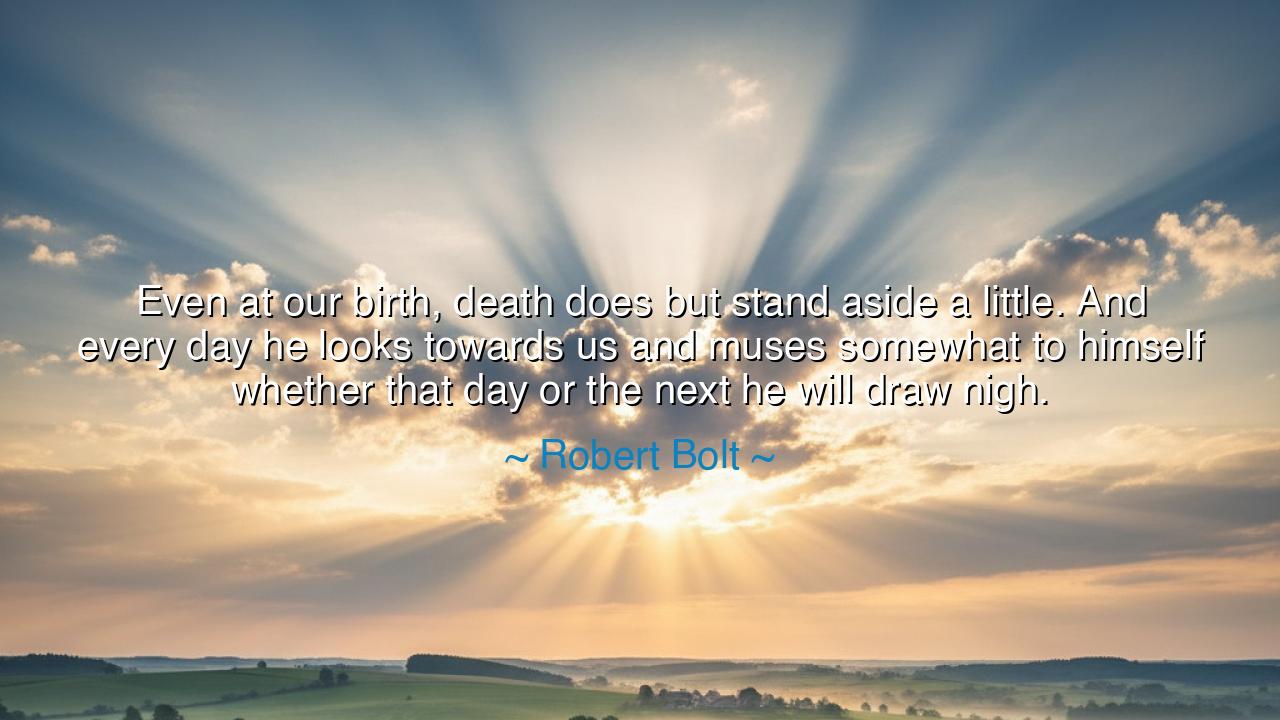
Even at our birth, death does but stand aside a little. And every
Even at our birth, death does but stand aside a little. And every day he looks towards us and muses somewhat to himself whether that day or the next he will draw nigh.






The words of Robert Bolt, “Even at our birth, death does but stand aside a little. And every day he looks towards us and muses somewhat to himself whether that day or the next he will draw nigh,” carry the somber majesty of eternal truth. In them, Bolt — the playwright of A Man for All Seasons — reminds us that death is not a sudden visitor, but a lifelong companion. From the moment the first breath enters our lungs, mortality begins its quiet watch. Death does not pursue us in hatred, but in patience; it waits, it observes, it muses. His words are not meant to terrify, but to awaken — to make us conscious that life is not infinite, and therefore must be lived with purpose, courage, and grace.
To the ancients, this awareness was sacred. The Stoics called it memento mori — the remembrance of death — and they wore it not as a burden, but as armor for the soul. They believed that by remembering death, one learned to truly live. For what is most fragile is often most precious. Bolt’s words carry that same ancient wisdom: that death’s nearness gives meaning to life’s moments. The child may not see it, the youth may deny it, but the wise man greets it as a shadow always cast beside the light. To live as if death stands always near is not to live in fear — it is to live in full consciousness of one’s finite flame.
In his reflection, Bolt gives death a kind of personality — not cruel, not malicious, but contemplative. “He looks towards us,” Bolt writes, “and muses somewhat to himself.” What a strange and beautiful image this is — death not as a destroyer, but as a philosopher, pondering when the appointed hour shall come. It evokes the same timeless truth found in ancient poetry: that life and death are partners in the same eternal dance. Death is not our enemy, but our boundary; not our negation, but our measure. Without his presence, life would have no urgency, no shape, no fire.
History has given us many who understood this truth deeply. Marcus Aurelius, the philosopher-emperor of Rome, ruled with the knowledge that every day might be his last. Amid war, plague, and betrayal, he wrote in his meditations: “Do not act as if you were going to live ten thousand years. Death hangs over you. While you live, while it is in your power, be good.” Like Bolt’s reflection, these words teach that to remember death is to remember the importance of now — to live with integrity, to love without delay, to act without hesitation. The proximity of death is not a curse; it is a compass that points us toward what truly matters.
And yet, there is tenderness in Bolt’s phrasing — a quiet compassion that softens the idea of death’s watchful presence. “He stands aside a little,” he says. Death is not an oppressor hovering above us, but a witness standing near the door, waiting for his hour with patience and dignity. Even in this, Bolt reveals the humility of man before the mysteries of existence. We are not meant to conquer death, for none can, but to live honorably within the time allotted. The wise see in this not sorrow, but serenity — the acceptance that life’s beauty lies in its impermanence.
This awareness of mortality can free us from vanity and fear. When one truly understands that every breath could be the last, pettiness dissolves, hatred fades, and the heart becomes humble. What power have envy, pride, or anger against the march of time? When death “looks towards us,” we are reminded that all our titles, possessions, and grievances will one day fade like morning mist. What remains, then, is how we have lived and loved, how we have used our short time to uplift, to create, and to honor the spark of existence entrusted to us.
So, my listener, let this truth settle deep in your soul: live as one who walks beside death, yet fears him not. Let his silent presence remind you to waste no hour in bitterness, no day in neglect. Be mindful that each sunrise is a gift granted anew, and each night a closing of a chapter that will not return. Live so that when death at last draws nigh — as he must — you will not tremble, for you will know that you have met him well-prepared, your lamp full of light, your spirit at peace.
For as Robert Bolt teaches, death does not steal life — he completes it. He stands beside every birth not to threaten, but to remind: the measure of your days is not their length, but their depth. Therefore, live fully, love greatly, and walk without fear — for though death watches, life still burns, bright and fierce, in every heart that remembers its own fragility.






AAdministratorAdministrator
Welcome, honored guests. Please leave a comment, we will respond soon